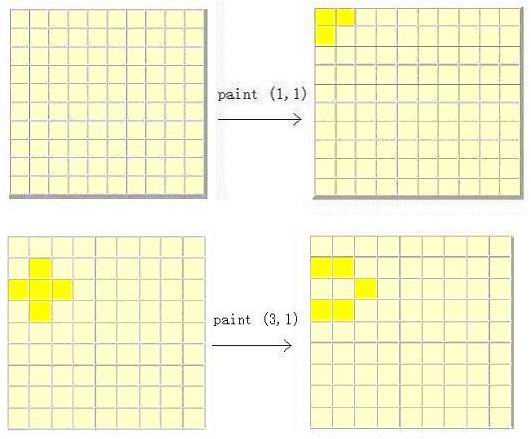Painter's Problem
| Time Limit: 1000MS | Memory Limit: 10000K | |
| Total Submissions: 5519 | Accepted: 2660 |
Description
There is a square wall which is made of n*n small square bricks. Some bricks are white while some bricks are yellow. Bob is a painter and he wants to paint all the bricks yellow. But there is something wrong with Bob's brush. Once he uses this brush to paint brick (i, j), the bricks at (i, j), (i-1, j), (i+1, j), (i, j-1) and (i, j+1) all change their color. Your task is to find the minimum number of bricks Bob should paint in order to make all the bricks yellow.


Input
The first line contains a single integer t (1 <= t <= 20) that indicates the number of test cases. Then follow the t cases. Each test case begins with a line contains an integer n (1 <= n <= 15), representing the size of wall. The next n lines represent the original wall. Each line contains n characters. The j-th character of the i-th line figures out the color of brick at position (i, j). We use a 'w' to express a white brick while a 'y' to express a yellow brick.
Output
For each case, output a line contains the minimum number of bricks Bob should paint. If Bob can't paint all the bricks yellow, print 'inf'.
Sample Input
2 3 yyy yyy yyy 5 wwwww wwwww wwwww wwwww wwwww
Sample Output
0 15
题意:poj1222开关问题的一般化情况,改变某一个开关的状态会影响周围四个开关的状态,让你求最少的改变次数,使得所有的开关都为y
思路:跟poj1222一样的消元法,但是……
上次的poj1222的系数矩阵是固定的,消元后正好是一个满秩矩阵,所以不用考虑无解的情况,也不用考虑回带答案,而这个题目很有可能会无解,很有可能要回带答案……
 上次完全没有考虑到这些情况……竟然就这么水过去了……
上次完全没有考虑到这些情况……竟然就这么水过去了……
代码
#include <stdio.h>
#include <string.h>
#include <algorithm>
using namespace std;
int a[35],x[230],map[20][20],b[230][230]; //b:系数矩阵的增广矩阵
int i,j,k,m,n,t;
int gauss(int n)
{ n=n*n;
int flag,c,i,j,k;
for(k=1,c=1;k<=n,c<=n;c++,k++) //k枚举行,c枚举列
{flag=0;
for(i=k;i<=n;i++)
if(b[i][c]==1){flag=1;break;}
if(flag==0){k--;continue;}
if(i!=k)
for(j=1;j<=n+1;j++)swap(b[i][j],b[k][j]);
for(i=1;i<=n;i++)
if(i!=k && b[i][k]==1)
for(j=1;j<=n+1;j++)b[i][j]=b[i][j]^b[k][j];
}
for(i=k+1;i<=n;i++)
if(b[i][c]!=0)return 0;
for(i=n;i>=1;i--) //讲道理这个地方是错误的,不一定自由未知量全是零的时候正好是最优解,但是题目数据弱也就这么水过去了……
{
x[i]=b[i][n+1];
for(j=i+1;j<=n;j++)
x[i]^=(b[i][j]&&x[j]);
}
return 1;
}
int main(int argc, char const *argv[])
{
char ch;
scanf("%d",&t);
for(int t1=1;t1<=t;t1++)
{ memset(a,0,sizeof(a));
memset(x,0,sizeof(x));
memset(b,0,sizeof(b));
scanf("%d",&n);
for(i=1;i<=n;i++) //构建矩阵
{getchar();
for(j=1;j<=n;j++)
{scanf("%c",&ch);
if(ch=='y')map[i][j]=0;
else map[i][j]=1;
b[n*i-n+j][n*n+1]=map[i][j];
b[n*i-n+j][n*i-n+j]=1;
if(i>1)b[n*i-n+j][n*i-2*n+j]=1;
if(i<=n-1)b[n*i-n+j][n*i+j]=1;
if(j>1)b[n*i-n+j][n*i-n+j-1]=1;
if(j<=n-1)b[n*i-n+j][n*i-n+j+1]=1;
}
}
int cnt=0;
int f=gauss(n);
if(f==0)printf("inf\n");
else
{for(i=1;i<=n*n;i++)
if(x[i]==1)cnt++;
printf("%d\n",cnt);
}
}
return 0;
} 
但是这个解法还是错的,这个代码里自由未知量假设的全是零,但是事实上不一定自由未知量全为0的时候1的个数最小,还需要枚举自由未知量的状态来求最优解……
但是题目数据太弱也就这么水过去了……
下次补上正确解法
























 930
930

 被折叠的 条评论
为什么被折叠?
被折叠的 条评论
为什么被折叠?








